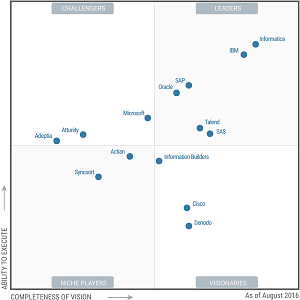News
Talend Says Data Integration Research Signals Open Source Milestone
- By David Ramel
- August 15, 2016
Companies often take to the newswires to trumpet being featured in Gartner Inc. "Magic Quadrant" research, but Talend Inc. just did it with a twist, claiming its inclusion in a new data integration report marks a milestone for the open source movement.
"We see Talend's inclusion in the Leaders quadrant as a huge win for the open source community," said Talend exec Chris Harrold in a blog post on Friday about Gartner's 2016 Magic Quadrant for Data Integration Tools report (free download upon providing registration info).
Talend provides a range of data integration functionality in its tools, such as the Talend Data Fabric, and relies heavily upon the wildly popular open source Apache Spark technology. "Talend is the leading open source integration software provider to data-driven enterprises and the first data integration platform built on Apache Spark," its Web site says.
Harrold highlighted that Spark connection in his blog post. "It's no secret that Hadoop and Apache Spark are the hottest technologies in Big Data, but what's less often remarked upon is that they're both open source based," Harrold said. "Talend has placed a significant bet of its own on Hadoop, Spark and open source in general, which is widely known and definitely well understood by both its customers and the analyst community. All the more reason we feel that our position in the Leader's Quadrant this year is notable."
That Leader's Quadrant has Informatica leading a group of six companies that includes IBM, SAP, Oracle, SAS and Talend. Not making the Leaders grade were some big names in the industry, including Microsoft and Cisco.
 [Click on image for larger view.]
Magic Quadrant for Data Integration Tools (source: Gartner via Talend)
[Click on image for larger view.]
Magic Quadrant for Data Integration Tools (source: Gartner via Talend)
Talend CEO Mike Tuchen said his company's inclusion in the Leaders quadrant marks the first time in five years that a new company has cracked that space. "We're very proud of this achievement, which I believe is representative of the broader shift taking place in the market with the introduction of new cloud and Big Data platforms," he said in a statement.
Talend's Ciaran Dynes also wrote about the company's open source journey -- and provided some background on the rigorous methodologies of Magic Quadrant research -- in his own blog post last week.
"Years ago, Talend made a strategic decision to 'double-down' on Hadoop, Spark and other open source-based Big Data technologies because we felt it was the only way to keep pace with the rapidly evolving marketplace," Dynes said. "Open source technology is backed by a massive community of bright, innovative minds. When it comes to software, the user experience and the capabilities the user needs far outweigh what any one developer or group of developers think users need."
While Talend's commentary on the report might be seen as self-serving as any who follow the time-honored tradition of publicizing their research accolades, it does reinforce many other recent indications that open source software has rapidly come of age in the enterprise development world.
Indeed, an April survey by Black Duck concluded that open source is "today's preeminent architecture." The company said open source serves as "the foundation for nearly all applications, operating systems, cloud computing, databases and Big Data."
That conclusion might serve as the basis for another report that soon followed, proclaiming an open source skills shortage. Among hiring managers polled, 59 percent were looking for open source talent, and 87 percent said it's hard to come by.
The relatively new sea change in the enterprise attitude toward open source has led to some rough spots in adopting the practice, however, prompting companies such as Red Hat and Docker to explain how to overcome open source development challenges.
Judging from Gartner's report, however, open source hasn't made that big of a dent in the data integration space, being mentioned only a handful of times. In fact, the sole reference to "open source" in the Talend section of the report comes in one of the "Cautions" statements about the company, stating Talend needs to focus on more roles in the environment and changes in market skills.
"Talend has its roots in open source, and with the technical community in general," the cautionary statement says. "Current market momentum is strongly moving toward enabling multipersonas and self-service integration options for nontechnical users. Talend has started addressing more personas with a self-service via Talend Data Preparation and hybrid cloud integration capabilities through iPaaS. Talend is investing in a new partner certification program and training for partners and customers."
Other than that, Gartner mentions only that one of Oracle's products leverages the Apache Kafka open source messaging system. The few other references to open source come in generalized comments.
"Overall vendor viability is reviewed and utilized by end-user organizations and developers in determining a supplier's capability to deliver ongoing production support," Gartner said in explaining its "ability to execute" criteria. "Importantly, open source solutions are measured here by the strength of their community and the overall capability of the governing body to guide the roadmap and manage open source projects."
Dynes echoed that importance on community in his post.
"The strongest software tools from a community-driven standpoint, are those that take constant and consistent feedback and suggestions from the community, publicly track that feedback, and move to incorporate the community-driven features into the product," Dynes said. "This 'community loop' is not only inherent to the success of open source software, but also a key element of the way in which Talend develops our solutions. For all of these reasons, we are delighted to be recognized by Gartner as a Leader in this year's Magic Quadrant for Data Integration Tools, indicating a clear 'changing of the guard' if you will, in the DI marketplace."
About the Author
David Ramel is an editor and writer at Converge 360.